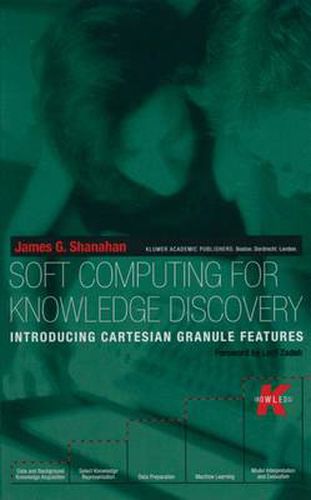Readings Newsletter
Become a Readings Member to make your shopping experience even easier.
Sign in or sign up for free!
You’re not far away from qualifying for FREE standard shipping within Australia
You’ve qualified for FREE standard shipping within Australia
The cart is loading…






This title is printed to order. This book may have been self-published. If so, we cannot guarantee the quality of the content. In the main most books will have gone through the editing process however some may not. We therefore suggest that you be aware of this before ordering this book. If in doubt check either the author or publisher’s details as we are unable to accept any returns unless they are faulty. Please contact us if you have any questions.
Knowledge discovery is an area of computer science that attempts to uncover interesting and useful patterns in data that permit a computer to perform a task autonomously or assist a human in performing a task more efficiently. This text provides a self-contained and systematic exposition of the key theory and algorithms that form the core of knowledge discovery from a soft computing perspective. It focuses on knowledge representation, machine learning, and the key methodologies that make up the fabric of soft computing - fuzzy set theory, fuzzy logic, evolutionary computing, and various theories of probability (for example naive Bayes and Bayesian networks, Dempster-Shafer theory, mass assignment theory, and others). In addition to describing many state-of-the-art soft computing approaches to knowledge discovery, the author introduces Cartesian granule features and their corresponding learning algorithms as an intuitive approach to knowledge discovery. This new approach embraces the synergistic spirit of soft computing and exploits uncertainty in order to achieve tractability, transparency and generalization. Parallels are drawn between this approach and other well known approaches (such as naive Bayes and decision trees) leading to equivalences under certain conditions. The approaches presented are further illustrated in a battery of both artificial and real-world problems. Knowledge discovery in real-world problems, such as object recognition in outdoor scenes, medical diagnosis and control, is described in detail. These case studies provide further examples of how to apply the presented concepts and algorithms to practical problems. The author provides Web page access to an online bibliography, datasets, source codes for several algorithms described in the book, and other information.
$9.00 standard shipping within Australia
FREE standard shipping within Australia for orders over $100.00
Express & International shipping calculated at checkout
This title is printed to order. This book may have been self-published. If so, we cannot guarantee the quality of the content. In the main most books will have gone through the editing process however some may not. We therefore suggest that you be aware of this before ordering this book. If in doubt check either the author or publisher’s details as we are unable to accept any returns unless they are faulty. Please contact us if you have any questions.
Knowledge discovery is an area of computer science that attempts to uncover interesting and useful patterns in data that permit a computer to perform a task autonomously or assist a human in performing a task more efficiently. This text provides a self-contained and systematic exposition of the key theory and algorithms that form the core of knowledge discovery from a soft computing perspective. It focuses on knowledge representation, machine learning, and the key methodologies that make up the fabric of soft computing - fuzzy set theory, fuzzy logic, evolutionary computing, and various theories of probability (for example naive Bayes and Bayesian networks, Dempster-Shafer theory, mass assignment theory, and others). In addition to describing many state-of-the-art soft computing approaches to knowledge discovery, the author introduces Cartesian granule features and their corresponding learning algorithms as an intuitive approach to knowledge discovery. This new approach embraces the synergistic spirit of soft computing and exploits uncertainty in order to achieve tractability, transparency and generalization. Parallels are drawn between this approach and other well known approaches (such as naive Bayes and decision trees) leading to equivalences under certain conditions. The approaches presented are further illustrated in a battery of both artificial and real-world problems. Knowledge discovery in real-world problems, such as object recognition in outdoor scenes, medical diagnosis and control, is described in detail. These case studies provide further examples of how to apply the presented concepts and algorithms to practical problems. The author provides Web page access to an online bibliography, datasets, source codes for several algorithms described in the book, and other information.